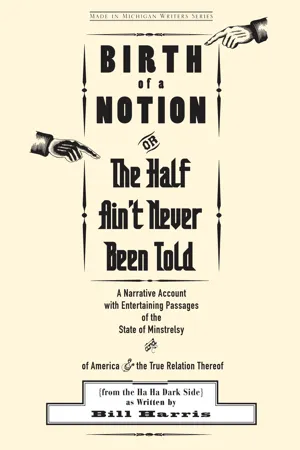
Birth of a Notion; Or, the Half Ain't Never Been Told
A Narrative Account with Entertaining Passages of the State of Minstrelsy and of America & the True Relation Thereof
- 232 pages
- English
- ePUB (mobile friendly)
- Available on iOS & Android
Birth of a Notion; Or, the Half Ain't Never Been Told
A Narrative Account with Entertaining Passages of the State of Minstrelsy and of America & the True Relation Thereof
About this book
A critical look at black identity in American history and popular culture as told from a performative African American perspective.
In Birth of a Notion, poet and playwright Bill Harris confronts contemporary stereotypes and prejudices by looking back to their roots in early American history. In a hybrid work of prose and poetry that takes its cues from nineteenth-century minstrelsy, Harris speaks back to preconceived notions about "blackness" through many different characters and voices. His narrative is at turns sarcastic, serious, wry, and lyrical, as he investigates the source of pervasive racist images and their incorporation into American culture.
Harris takes readers on a tour of nineteenth-century American history, from the 1830s and the rise of the abolitionist movement, to Reconstruction and the Industrial Revolution in the 1860s, and to the beginning of the twentieth century. He considers cultural productions that gave rise to America's idea of the "new Negro, " including the development of minstrelsy as popular entertainment, the publication of Uncle Tom's Cabin, the museum curios of P. T. Barnum, and the exhibitions of "exotic" people at the 1893 Chicago World's Fair. Along the way, Harris interjects a range of symbols, word-play, and famous personalities into his narrative, referring to everyone from Karl Marx, Uncle Sam, Charles Dickens, Buffalo Bill, and Walt Whitman. He ends with the development of jazz and the blues as cultural products that would become important vehicles for self-representation in the new century.
Harris's fast-paced narrative interspersed with graphic elements shows the importance of point-of-view in creating history, which always contains some elements of fiction as a result. Anyone interested in poetry, American history, and African American studies will appreciate Birth of a Notion.
Frequently asked questions
- Essential is ideal for learners and professionals who enjoy exploring a wide range of subjects. Access the Essential Library with 800,000+ trusted titles and best-sellers across business, personal growth, and the humanities. Includes unlimited reading time and Standard Read Aloud voice.
- Complete: Perfect for advanced learners and researchers needing full, unrestricted access. Unlock 1.4M+ books across hundreds of subjects, including academic and specialized titles. The Complete Plan also includes advanced features like Premium Read Aloud and Research Assistant.
Please note we cannot support devices running on iOS 13 and Android 7 or earlier. Learn more about using the app.
Information
Table of contents
- Cover
- Title Page
- Copyright
- Dedication
- Contents
- Preface
- Introduction: In the Beginning
- Chapter 1 Treats of the Parallel Rise of the Industrial Revolution, the Blues, Radical Abolitionism & Mechanical & Martial Time
- Chapter 2 Treats on the Parallel Rise of Radical Abolitionism, American-Born Blackface, Immigrant Upper-Lower & Lower-Middle Classes, and Their Indoctrination in the Ways of American Life & Free-Time & How to Spend It, 1831
- Chapter 3 A Brief Passage on the Emergence of the Democratic Party, Daddy Rice, Uncle Sam, Indians & “Discovery,” 1832
- Chapter 4 Treats of Minstrels and Minstrelsy, Invention of the Common Man, the Jacksonian Era, and Indians Conceding Their Lands
- Chapter 5 The Middle Passage: P. T. Barnum, History as Entertainment in Multi Voices, 1835–1842
- Chapter 6 A Middle Passage, or Bridge: Traversed by Frederick Douglass, William Henry Lane, and a Sense of the Increased Speed of Things, 1843–1848
- Chapter 7 Daddy Rice Runs the Doo Doo Down: Harriet Beecher Stowe and John Brown Turn Up the Heat, 1848–1870
- Chapter 8 The Civil War & Beyond Back to Where We Began: And Notions of High & Low Culture; Dividing to Conquer, 186?–1871
- Chapter 9 Reprise of the Bridge Crossing Theme: A Variation with a Blues Tinge
- Chapter 10 Reconstruction & Beyond: William T. Sherman, Eadweard Muybridge & Syncopated Loco-Motion of Moving Images & the Transcontinental Railroad, 1871–1877
- Chapter 11 Jim Crow Crosses Over from Entertainment to Law, the Parallel Rise of Klan-Whiteface in White Face & Black Faced Blackface & Slave Spirituals
- Chapter 12 W. E. B. Du Bois & Booker T. Washington Step Up & Step Out & Black Minstrelsy Turns a Corner, P. T. Barnum Crosses A Bridge, Rag Kicks Up Its Heels & Thomas Jefferson Shows His Dark Side, 1880s–1890s
- Chapter 13 Entering the White City: Shunted to the Shadowy Margins, but Tapping Out a Syncopated Meter, a New Tune, Whose Force Changed the Way the White City Denizens Go About Their Goings About & the Freedom & Dignity with Which They Go About It & the Relative Positions They Assume in the New World A-Comin’, Guest Starring Christopher Columbus, Eadweard Muybridge, Frederick Douglass, Ida B. Wells, Little Eva, Frank Baum & Others, 1893
- Chapter 14 The Buffalo Bill Show’s Rough Ride Across the Bridge from Old History to New Myths, Featuring Annie Oakley, Sitting Bull, Queen Victoria & Walt Whitman
- Chapter 15 The Long March of Change Continues: Vaudeville Arrives, Booker T. Washington, W. E. B. Du Bois & the Blues (at Their Beginning) Return & Rag’s Infection Rages, as We Consider Voodoo, Thermodynamics & Continue to Hear Dead People & Living Spirits, 1898–1900
- Illustration Credits